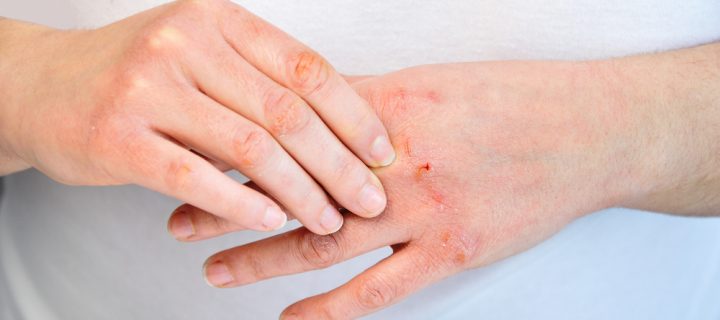Use the right soap and moisturizer, wear gloves, and avoid certain ingredients.
Soap and hand sanitizers are both great inventions. Without them we would undoubtedly spread many more germs around than we already do.
Soap works well to remove the physical dirt and grime from your hands, as well as things like the virus that causes COVID-19. It does this by pulling contaminants away from your hands and suspending them in the water you rinse with. This happens because one end of a soap molecule is very attracted to water (hydrophilic) and the other end hates it (hydrophobic). This causes the soap to attach itself to the dirt and germs and pull them away from your skin, dropping them in water.
Related: Mouthwash and Human Coronaviruses: Can It Kill Them?
Hand sanitizers work a bit differently. Sanitizers fight viruses by disrupting their outer coating. While sanitizers won’t protect you from everything, (norovirus unfortunately survives hand sanitizers), they can also fight off bacteria by destroying their cell membranes.
The only trouble is, both soap and hand sanitizers can make you feel like you’ve run your hands through a hot open fire once you’ve had to use them too often for too long. This can be especially true in colder winter months. So, what can you do to best protect yourself? Here is a look.
Why Your Skin Cracks
Before uncovering the best solutions, let’s look at why soaps and sanitizers leave your hands thirsting at the bit for moisturizers in the first place. This happens because both soap and sanitizer strip your skin of its natural oils. Ouch! And once that cycle of dry, raw, irritated hands begins, it can be difficult to repair.
Dos
There are some habits that can help you over time. Dr. Justin Ko who is chief of medical dermatology at Stanford Health Care told TIME magazine that he washes his hands about 100 times a day due to his profession. Here’s what he advises you do.
If you can, try to use hand sanitizers instead of soap and water, when it applies to the situation. Sanitizers, Ko says, dry your skin out less than soap. So, if you touch a public door handle or you use the self-checkout station at the grocery store, use some sanitizer to kill the germs. If you get mucky raking the leaves in the backyard, however, use soap to get the dirt off.
Related: Aspirin is Saving the Lives of Severe Coronavirus Patients
Experts also advise that you pat your hands dry instead of rubbing them on a towel after washing. Every bit counts. Rubbing can remove more oils and irritate your hands even further.
For best results, leave a bit of water on your hands after washing and patting, and then apply some moisturizer right away. This can help lock the extra moisture into your skin.
Don’ts
Of course, there are things you can avoid as well, in order to help keep your hands at their best. When it comes to moisturizers, there are some better choices to make. Anything that contains fragrances, known allergens, retinol, and anti-aging serums are best avoided. All of these ingredients can serve a purpose but they can also aggravate your sensitive hands.
In addition, when washing your hands with soap… use hand soap! This is a biggie. While it may be tempting and convenient to use the dish soap sitting next to your faucet in the kitchen to clean up, that stuff is specifically engineered to attack grease with a vengeance. You don’t need to overdo it.
Related: COVID-19 Outbreaks and Your Processed Foods
Remember those commercials? Greasy, coated dinner plates that come instantly clean in the dishwater? Yeah, leave this soap for the holiday gravy. It’s not meant for your skin.
Finally, look for creams that are designed specifically to nourish your hands. Body lotions contain a lot of water and can actually dry your skin out more when the water evaporates after you apply them. Thick hand creams are what you need to best protect your hands.
When Things Get Really Bad
Hopefully your skin survives the coming winter in good shape. Should you hit a rough patch, however, you may have to pull out all the stops. Cracked thumbs and fingers that bleed are certainly no fun. This can be not only painful but also dangerous, leading you open to further infection.
If you are living in a cold climate, be sure to wear gloves or mittens when you are outside, at all times. This will protect your hands from the force of the wind, which can be mighty in just minutes.
You should also consider purchasing household rubber gloves to wear while doing your dishes if you wash in the sink. Use rubber gloves while handling cleaning supplies, to avoid contact with your skin.
Are you really drying out? For a deep treatment, coat your hands in Vaseline while sleeping at night and wear gloves to bed for that ultra-moisturizing experience. It really helps.
If your hands seem infected contact your doctor.
photo credits: cunaplus/Shutterstock.com












